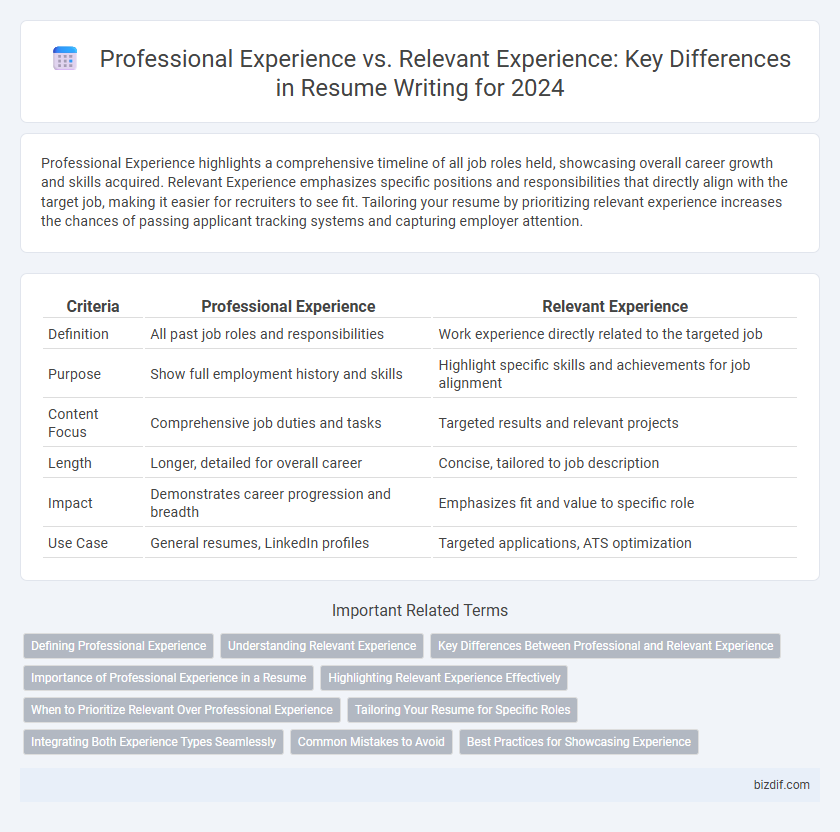Professional Experience highlights a comprehensive timeline of all job roles held, showcasing overall career growth and skills acquired. Relevant Experience emphasizes specific positions and responsibilities that directly align with the target job, making it easier for recruiters to see fit. Tailoring your resume by prioritizing relevant experience increases the chances of passing applicant tracking systems and capturing employer attention.
Table of Comparison
| Criteria | Professional Experience | Relevant Experience |
|---|---|---|
| Definition | All past job roles and responsibilities | Work experience directly related to the targeted job |
| Purpose | Show full employment history and skills | Highlight specific skills and achievements for job alignment |
| Content Focus | Comprehensive job duties and tasks | Targeted results and relevant projects |
| Length | Longer, detailed for overall career | Concise, tailored to job description |
| Impact | Demonstrates career progression and breadth | Emphasizes fit and value to specific role |
| Use Case | General resumes, LinkedIn profiles | Targeted applications, ATS optimization |
Defining Professional Experience
Professional experience encompasses all work history, including full-time, part-time, internships, and freelance roles that demonstrate an individual's career development and skill set. It highlights the breadth of employment across different industries, positions, and responsibilities that contribute to overall expertise. Defining professional experience centers on showcasing consistent job performance, acquired competencies, and accomplishments that validate a candidate's readiness for new opportunities.
Understanding Relevant Experience
Relevant experience highlights specific skills and accomplishments directly related to the job you are applying for, tailoring your resume to match the employer's requirements. This type of experience demonstrates your ability to perform the role effectively by showcasing targeted expertise rather than listing all professional history. Focusing on relevant experience improves your chances of passing applicant tracking systems and catching the recruiter's attention.
Key Differences Between Professional and Relevant Experience
Professional experience encompasses the entirety of a candidate's work history, highlighting all roles, industries, and responsibilities held over time. Relevant experience specifically targets the job-related skills, accomplishments, and positions directly aligned with the requirements of the prospective role. Understanding this distinction allows for tailored resumes that emphasize capabilities most pertinent to the employer's needs, improving candidate suitability and selection success.
Importance of Professional Experience in a Resume
Professional experience showcases a candidate's comprehensive work history, demonstrating acquired skills, industry knowledge, and career progression essential for employers to assess long-term value. Highlighting professional experience provides credibility and context, emphasizing consistent performance and adaptability across various roles. This depth of experience often outweighs relevant experience by illustrating a broader capability to handle diverse job responsibilities and challenges.
Highlighting Relevant Experience Effectively
Highlighting relevant experience effectively requires tailoring your resume to emphasize roles and skills directly aligned with the job description, ensuring keywords and achievements match the employer's needs. Prioritize accomplishments and responsibilities that demonstrate your ability to excel in the specific position, using quantifiable metrics to showcase impact. This strategic focus helps recruiters quickly identify your suitability, increasing chances of selection over a broad listing of professional experiences.
When to Prioritize Relevant Over Professional Experience
Prioritize relevant experience over professional experience when applying for roles that require specific skills and industry knowledge directly related to the job description. Highlighting relevant experience showcases your suitability and ability to perform tasks critical to the position, even if your overall professional experience is broader or less directly related. This approach improves keyword alignment with applicant tracking systems (ATS) and captures the employer's attention by demonstrating immediate value.
Tailoring Your Resume for Specific Roles
Tailoring your resume for specific roles requires distinguishing between Professional Experience and Relevant Experience to highlight the most impactful qualifications. Emphasizing Relevant Experience involves selecting and detailing roles, skills, and accomplishments directly aligned with the job description to improve applicant tracking system (ATS) compatibility and attract recruiter attention. This targeted approach increases the likelihood of passing initial screenings and securing interviews by showcasing your fit for the specific position.
Integrating Both Experience Types Seamlessly
Integrating Professional Experience and Relevant Experience seamlessly in a resume enhances clarity and impact by showcasing both long-term career achievements and targeted skills for the specific role. Tailoring job descriptions to highlight transferable skills and quantifiable results aligns with applicant tracking systems (ATS) and recruiter expectations. Combining these experience types in a cohesive format improves overall resume effectiveness and increases interview opportunities.
Common Mistakes to Avoid
Confusing Professional Experience with Relevant Experience often leads to resume clutter, weakening your application by including unrelated job roles that do not showcase your qualifications for the target position. Avoid listing every past role; instead, tailor your resume to highlight achievements and skills directly aligned with the job description, emphasizing impact and results. Neglecting to differentiate these sections can reduce clarity and hinder recruiters' ability to quickly assess your fit for the role.
Best Practices for Showcasing Experience
Highlight professional experience that directly aligns with the job description to optimize resume impact. Emphasize accomplishments, quantifiable results, and specific skills acquired to demonstrate value. Tailor relevant experience sections by prioritizing roles and projects that showcase expertise most pertinent to the desired position.
Professional Experience vs Relevant Experience Infographic

 bizdif.com
bizdif.com